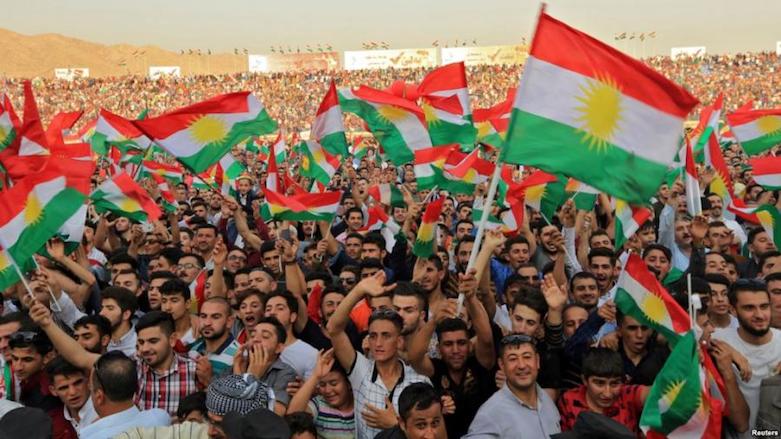ERBIL (Kurdistan 24) – During a regular visit to the Kurdistan Region, three British officials, members of the All-Party Parliamentary Group (APPG) on the Kurdistan Region in Iraq, praised the ongoing friendship and partnership the United Kingdom shares with the Kurds.
The delegation included Gary Kent, the Secretary of APPG on Kurdistan, Chairman and Conservative Party Member of Parliament Jack Lopresti, and Robert Halfon, a member of the APPG on Kurdistan who is also a Conservative Party MP.
Upon their arrival in the Kurdistan Region capital of Erbil on Monday, the three British officials delivered remarks at a reception at the European Technology and Training Centre (ETTC).
Lopresti, who last visited the Region during the historic independence referendum in September, recalled the vibrant atmosphere of Kurdistan then, reminding of Baghdad’s “brutal” response to the peaceful vote.
“We were here back in September for the referendum, which was a wonderful time to be in the Kurdistan Region, such optimism, such vibrancy, and such hope for the future,” he stated, “and then we saw the brutal reaction from Baghdad and other players in the region.”
The MP conveyed his disappointment with the Iraqi government who rejected the results of the referendum and imposed several punitive measures on Kurdistan including an international flight ban and the use of military force to regain control of disputed areas.
“We were shocked, upset, and our hearts were here with you,” he said.
The APPG on Kurdistan and Iraq visited Baghdad for the first time on Sunday where they met with President Fuad Masum among other officials.
Lopresti said the experience was “interesting,” noting that “there seems to be a mood for reconciliation and dialogue” between Erbil and Baghdad.
The Kurds are an indispensable force in Iraq, the MP said, highlighting the sacrifice of the Peshmerga who fight for “the preservation and protection of all our freedoms” in the war against the Islamic State (IS).
“The Kurdish Peshmerga have done an amazing job in helping to defeat [IS]. And by getting rid of the scourge of [IS] from Iraq, you have also helped in keeping our own streets safe and free and the protection of our own way of life,” he said.
Although “the dream of independence is off the agenda for now,” Lopresti said, “it is a time of greater unity within Kurdistan, continued reform—continued political reform.”
He concluded by reiterating the friendship and partnership which the UK shares with the people of the Kurdistan Region, hoping for even stronger relations in the future.
Halfon, meanwhile, praised Kurdistan and described it as “a beacon of stability” which has been able to develop democracy as well as establish the rule of law in “a troubled region.”
“I think that the Kurdish nation is one of the greatest nations that we have in the world,” he said. “The Kurds are people who don’t live in the past but learn from the past.”
The MP added that it was “absolutely the duty of the free world—of the West, of the United Kingdom—to support the Kurdish nation both militarily, economically, and politically, and in terms of civil society” because of the Kurds’ “love for freedom.”
Kent, a deputy chairman of the ETTC, praised the organization and described it as a “respected and efficient” institute which works “to build the capacity of Kurds and the Kurdistan Regional Government.”
A non-governmental organization, the ETTC provides development and migration projects and offers a wide range of training, workshops, and other events for the development of Kurdistan.
“Whatever the future holds for the Kurdistan Region, making itself match fit for that purpose by training its people and maximizing unity and reform of the economic and political system is vital,” Kent explained.
Although the British officials did not elaborate on their visit, a series of tweets from Kent revealed that they had met with various parties and groups in the Kurdistan Region where they discussed current issues as well as improving bilateral relations with the UK.

